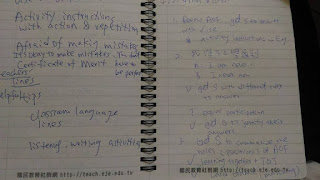Before Demonstration
I'll tell
the event planner that I'm really willing to help check the teacher's lesson
plan prior to the real performance if that's fine with him or her. Of course,
this is not mandatory, but if I do
get one, I'll carefully examine it with the following features which would help a lotto clarify some doubts: objectives,
activities, assessment, materials, and time distribution. Lesson plans can come
in a variety of forms and formats, but I always keep those five key elements in
mind and raise some questions for discussion according to the lesson plan. Take this one for example:
get one, I'll carefully examine it with the following features which would help a lot
2. 流程一中提到翻譯、排序及「討論文章內容」,請問討論文章內容指的是?
3. 程度好設計問題,程度不好畫圖,此為差異化教學概念。一般的差異化教學會將學生依程度分為高、中、低三組,老師可想想程度中等的同學可針對閱讀做什麼?
4. 不知學生之前有無做過類似畫圖的活動?若無,老師可在活動前提供一範例,學生在討論期間會較有具體概念須要完成什麼。
5. 程度不好的同學須於畫圖活動完成後緊接著由程度好同學教導如何正確念出題目。因接下來還會有二組須上台報告所完成的圖,不知學生在何時可準備如何報告?
6. 建議當天可將教案、學習單及所上課的課文內容等影印裝訂後給前來觀課的老師們。
7. 建議老師可思考此次公開課經驗如何融入教甄的教學演示?例如如何以全英語說明在活動前、中、後的指導語及回饋等。在口試部分,若抽到的題目為「如何因應會考挑戰」、「英語閱讀教學」、「差異化教學」、 「分組合作學習」、「補救教學」等相關教學實務問題,如何以全英語回答。
其實您最瞭解班上學生,且觀課及議課是蠻主觀的,所以您可擷取上述適合自己班上、適合自己教學風格的部分再加以思考。"
The above
is a recent example of how I discussed the lesson plan with the presenter in advance.
As you can see, being judgmental is absolutely something I want to avoid no
matter what. So, I'll reiterate that it's perfectly okay with me if they decide
to stick with the original plan. After all , I don't want to jump into
conclusion based on only the lesson plan.
During Demonstration
A lot of
things are going on in my head when sitting in the back of the classroom. I
need to be completely focused and well prepared for my job as an adviser:
1. A
quick summary of the teaching procedures. This would indicate that I am
preoccupied with everything in the classroom later in the meeting. I'll
specifically pay attention to the seating, grouping, rewarding system, positive
interdependence, individual accountability, equal participation and so on of
the whole process of demonstration.
2.
Strengths of the demonstration. I always bring up the strengths first before providing the rest of my opinion. For example, I usually compliment the
teacher's attempt of giving activity instructions in English, being skilled at
handling the CALL equipment, using intriguing board games and authentic learning
materials, complete with students' active participation, to name just a few.
3.
Questions regarding the demonstration. Coming up with good thought-provoking
questions is an art. Again, I've met some professors and teachers who appeared
quite authoritative and overbearing. They thought they could just judge a teacher with only one class observation, not to mention that
they know nothing about both the students and the teacher at all. I don't want to be a
jerk like that.
4.
Suggestions. This is absolutely my favorite part. Based on what the teacher
presented, I'd look for similar activities I've done in my own class for their future reference. The more I try out new stuff in my class, the more I can
offer my advice as an alternative to the original one. Currently, I often
share activities with regard to reading strategies, fun grammar application and
how to get students to speak in English.
After Demonstration
1.
Expressing gratitude towards the demonstrator and the event planner. I
know how challenging, sometimes even intimidating, it can be for a teacher to
publicly teach in front of others. Also, I would like to set the tone first
that we're not here today to judge; instead, we're here
to learn from each other.
2.
Quickly going over what is in my notes. This includes a brief summary of the
class, the highlights of the demonstration and my questions about the teaching.
3.
Inviting the demonstrator to reflect on his or her own teaching today. If they
need to do it one more time, what would they do to make it better?
4. Asking
the participants to give their feedback. This is where I can learn about
whether I've missed on something important and also what other features that
they value most.
5. The Q
and A session. Frequently asked questions include: "Would this
student-centered approach help with the grades?", "Would it slow down
my schedule?", "Would I be able to cover everything before the
exams?", "The preparation seems very time-consuming, how do I make
time for it?", "What if my students are getting very noisy in my
class?".
6.
Providing nuggets to take away. This is when this teaching blog comes in handy
because I can immediately show off my lesson plans, pictures, video clips,
activities, students' feedback and so on with the participants.
This job
of mine is really challenging and rewarding. I really picked up many great
teaching ideas from those teaching demonstrations. On top of that, in order to
provide the nuggets, I am also propelled to relentlessly take what I learned
into practice in my own class. To sum up, taking part in the class participation and discussion is totally a virtuous cycle to me
because it satisfies my cravings for learning as well as sharing. On top of that,
what really matters is that I can contribute to promoting this teaching
approach and thus benefit some teachers out there.















No comments:
Post a Comment